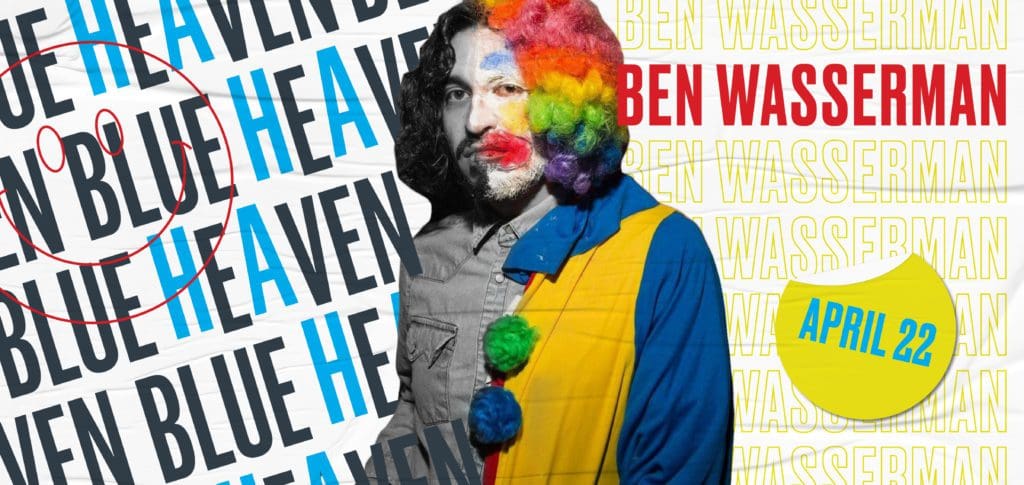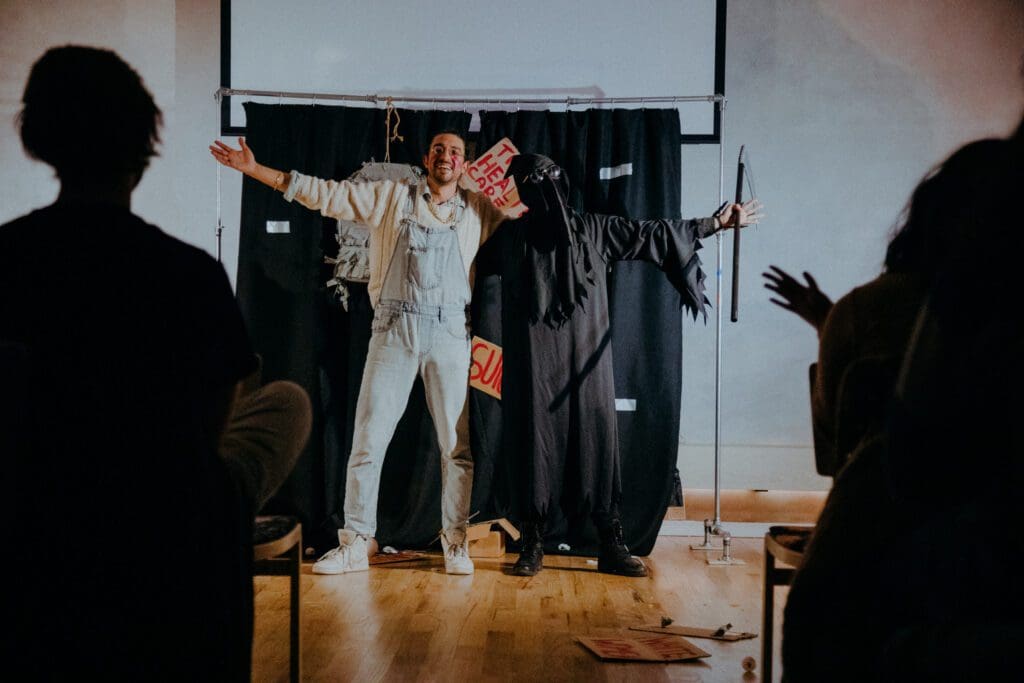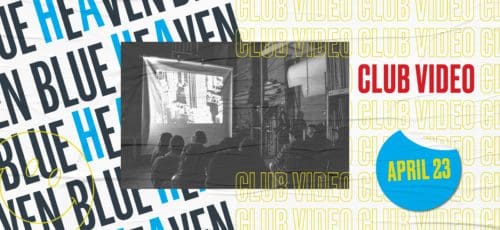Interview with Ben Wasserman
Meet Blue Heaven: Saturday Night performer, Ben Wasserman! In Ben’s show, Live After Death, he leads his audience through grief using comedy, clowning, and crowd work. The show had a sold out run at Sparrow Funeral Home (a real active funeral home in NYC) and Ben has performed in comedy theaters, jazz clubs, record stores, and death museums across the country. Tickets for Blue Heaven are on sale now. Get em while they’re hot! Read on to learn a little bit more about Ben.
In three words, what is comedy all about for you?
Being really funny.
Where did you learn to cope with loss through comedy? Was there an artist or a family member that inspired this kind of self-expression?
I’m self-taught 🙂 No, I don’t know! I’d been doing comedy for a few years already when my people started dropping like flies, and while in the throes of grief I couldn’t not talk about this gigantic pain I was experiencing. But I didn’t study any of the “grief masters” or anything like that. I’ve always been, for better or worse, loudly and unapologetically expressive about how I feel and what I think. I don’t know if I can point to any person in particular, whether family or artist, as inspiration for that. Maybe the history and entirety of the Jewish people did it?
Your show, Live After Death, is deeply personal. You confront the loss of your dad, granddad, uncle, and four of your friends. However, as a comedy show, it is highly public and communal in a way that grief usually isn’t. It’s been recommended by The New York Times and grief groups alike. How does your show bridge a gap between those who have experienced loss and those who haven’t?
On the most basic level, whether you’ve already lost someone or not, you’re going to. And, you’re also gonna die. Sorry! But, beyond that I think there are so many ways we interact with death and grief: you can reflect on your own mortality, you can mourn someone, you can care for someone dying, you can be scared or welcoming of it all, you can believe in an afterlife – there are so many places and times we enter and exit the highway of death. Ew the highway of death? Sorry about that. I don’t usually do metaphors and I got grossed out as I read that back but I’m leaving it because I’m strong enough to be vulnerable. Anyway, I see the show as a container to explore all the different experiences, thoughts, and feelings people have with death, loss, and grief regardless of where they’re at with all of it. And, while the show is deeply personal, born out of losing my own family and friends, I ask people to keep their hearts and minds on the people they’ve lost or love throughout the show. I’ve found that let’s people project what they want into the show and get out of it what they need, whether that’s community or less isolation in their grief, some processing or awakening of memories, laughter and joy, whatever it is.
When you were writing this show, was there ever an aspect of caution? What are your thoughts on writing comedy about death in a world that just faced a global pandemic and is quick to cancel jokesters?
God, I wish I got canceled for this show!! “Hey this guy is TOXIC…he’s…lost people!!!”. No, there was never really any caution about the subject matter. . I don’t think it’s a particularly provocative or controversial topic…again we’re all dyin and losing people and I’m not the only comedian to talk about it! But also, in a real way, I’ve found that in the face of an ongoing pandemic that we’re all still trying to navigate and trudge through, where so many people were forced to lose and grieve, there’s never been a better time to talk about all this stuff.
You had a sold-out run of Live After Death at Sparrow Funeral Home in New York City. How do you think performing in that space changed the show?
Performing the show in funeral homes has been super cool. It’s been wild to see folks come to a place like Blair-Mazzarella Funeral Home (which is where I’m doing it now in Brooklyn) that’s been around for over 100 years…for a comedy show?? And, I’m excited to be bringing it to more funeral homes, cemeteries, coffin factories, and death museums around the country this year because I think it does add a little something to the vibe. I’m not sure if performing in funeral homes changes the show, as much as performing in funeral homes changes those spaces? Most of the time, we go to a funeral home or a cemetery to deal with the “dead” part of death: we observe, we bury, we leave. But so much of facing death and loss is in what happens after that. How do we grieve and mourn? How do we continue living after loss? And yes, Live After Death is a comedy show, it’s not a grief support group or a workshop on preparing your will or anything like that, but it is a way for these institutions to continue the conversation and relationships with their communities?
What kind of connections with your audience have you built through this performance?
Depends on what we mean by connection! Anyone who shares their experiences with loss and grief during the show or participates in a bit, I feel connected to them. Their names, their memories, their stories, often those become the emotional underpinnings of the show for me, cause I’ve already heard my own story. And they stick with me long after. I still think about the guy who used a moment in the show to come out to his dead dad. And I’ve gotten plenty of audience members who come up to me after the show, thank me for providing a space where they could process or feel less alone. There’s a good number of people who have come back to see it 2 or 3 times, bringing their friends who they feel could use it. And that’s all been really cool and nothing I ever anticipated my comedy ever doing for people. Though I will say there is one person who came to one of the first shows and has since started doing comedy to help process their own losses and that I can’t stand for – I feel awful about it because I strongly believe nobody should be doing comedy.
Has writing this show, meeting audience members, and traveling around the east coast to perform changed your relationship with grief?
Not really? Maybe? It’s hard to say. By the time I did the show for the first time, I was pretty OK in my relationship with grief. I’d already had a couple of heavy processing years under my belt, and sure while I still miss my loved ones and grieve cause it never goes away, I’m doing just fine with it all. And I’m still OK after doing the show for the last year, no worse, no better. But going back to something touched on earlier, I think in the same way folks leave the show feeling less isolated in their grief, so do I. But I don’t think doing the show has changed anything about how I grieve – maybe audience members need to step it up to change me!
What do you see as being next for you? Grief is a lifelong project. Do you see yourself making more art on this topic?
To me, life is the project and grief just happens to be one of the shittier aspects of life. And sure, you’re never free from it, but I’m getting ready to hang up the hooded cloak and scythe. Don’t get me wrong, I love doing this show and sharing it with people, but I think it’s the end of my “death period”. I’m not fully sure what’s next but my partner of 5 years and I just broke up a few days ago and I’ve been reflecting a lot on relationships, romance, connection, and commitment soooo…look out for Ben Wasserman: Live After Love in 2024? Could be fun 🙂
Interview by Jackie Carroll



